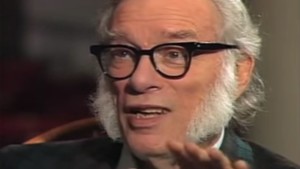I was a big science fiction fan as a kid. I read everything I could find by Isaac Asimov, and I memorized episodes of Star Trek. In high school, I subscribed to Asimov magazine, and it was from reading the short stories and novellas therein that I came to the realization that the Golden Age of science fiction was long gone. So I was somewhat prepared to be cynical when Star Trek: The Next Generation debuted my senior year.

“The saddest aspect of life right now is that science gathers knowledge faster than society gathers wisdom.”–Isaac Asimov
On the whole, I enjoyed the show, but a comparison between the two Star Treks at the time confirmed for me that the adventure, mystery, and humanity of the original was losing out to militarism, expertise, and a kind of bureaucratic stuffiness in the new series. Later seasons managed to fix many of the glaring problems of the early seasons, but I had lost interest by then, and was devoting my creative energies to music and Shakespeare.
One episode summarized the problems for me. All I can remember about it was that some kind of tear had opened up in the space-time continuum (!), and if the Starship Enterprise couldn’t get there and knit it up somehow, that reality would cease to exist. No pressure! Beneath the surface of this implausible plot device, it would appear that human beings have become responsible for literally everything.
And isn’t this how we all feel sometimes? We are urged to feel simultaneously responsible for:
Reducing global temperatures
Every questionable thing the President says or Tweets
Making sure people in Michigan don’t die of COVID-19
Figuring out how to get our two-year-olds into Stanford
Ending terrorism (or evil itself, if George W. Bush is to be heeded)
Getting the bishops to be more disciplined
Making sure no kids anywhere get bullied
Donating to groups fighting cancer, Alzheimers, et al
Ending poverty
Murder Hornets
Now I assume that, most of the time, our conscious minds understand that we can’t do everything. But the cumulative effect of the impulse to solve every problem is chronic anxiety. As I wrote in the previous post, this is, in fact, a recipe for irrationality. To assume responsibility for all of the world’s problems is fundamentally unreasonable, but we rarely permit ourselves to admit this squarely. The result is a worldview with a large, false supposition built in.
According to family systems therapy, stress is not produced by overwork. Rather, overwork is one symptom of stress that has its roots in being overly responsible. Our present stressed-out overfunctioning is further fueled by a simplistic notion that our American political system is a democracy. It’s not, in fact. We live in a representative democracy, more formally called a republic. The reason I point this out is that a flat ideology of “democracy,” suggests that we are all responsible for everything in our country, and that the only way to address this responsibility is through constant monitoring of the news and constant argument. And it’s exhausting!
What if we’re not responsible for all that other stuff? Who might be? What if we felt that, behind it all, the maintenance of the space-time continuum was God’s prerogative and not ours? I often find that God raises up ingenious and courageous helpers at fortuitous moments. These helpers see the same problems I see, but have the intelligence, experience, and resources that I lack. It’s always possible, too, that a problem can’t be solved immediately. I will return to that possibility below.

“We feel that we must disagree with those prophets of doom who are always forecasting disaster.”–Pope Saint John XXIII
Pope Saint John XXIII offered this prayer each night before bed: “Well Lord, it’s your Church, you take care of it; I’m going to sleep.” Similarly, when Napoleon Bonaparte confronted Cardinal Consalvi and threatened to destroy the Catholic Church, the Cardinal’s response was, “Your majesty, we, the Catholic clergy, have done our best to destroy the church for the last 1,800 years. We have not succeeded, and neither will you.”
These are quotes by men of deep faith, but they are also clear-eyed realists. There’s nothing childish about this faith. It’s an acknowledgement that there are powers at work in the world well beyond what we can touch. Our task is to figure out our assignment and then resolve to stay at our posts. The pagan heroes of old understood that fate was not something that they could determine. It was, however, theirs either to reject or to accept nobly and graciously. By accepting fate, heroes also accepted the relatively confined spheres of action in which it is enacted. Beowulf died slaying the dragon that was threatening his native Geatland (southern Sweden), but the dragon never was a serious threat to the lands of most other contemporary peoples. Peruvian dragons were, presumably, for Peruvian heroes to deal with. And in heaven, the great band of dragon-slayers will have its own special space at the bar where they will hang out and share stories from every corner of the globe.
Realism is central to thinking rationally about our options for acting. Hyper-responsibility inclines us either to grandiose, impossible projects, or to paralysis. Bipolar disorder happens when someone oscillates between these two unrealistic options. Some choose to escape this oscillation by a strategic retreat into chronic complaint. None of these approaches are reasonable, nor are they mature. Hidden fears are continuing to contaminate our thinking.
Faith is a gift from God. This gift frees us from fear, and it frees us to risk the good even when we might suffer for it. In our present climate, I suspect that many of us are tempted to choose lesser goods because, in a highly polarized environment, we fear failure, rejection, and ostracization. If we remember that our Leader leads by way of the Cross, we can let go of the notion that the suffering we experience is a sign of God’s rejection or our failure. Nor is it our responsibility even to change those who cause us suffering, any more than Christ felt it important to win over Pilate and the Sanhedrin.
Faith is often presented as the opposite of reason, but this is a mistake. The opposite of reason is reactive fear. Faith is the friend of reason. In fact, it is the precondition for the full flowering of reason.